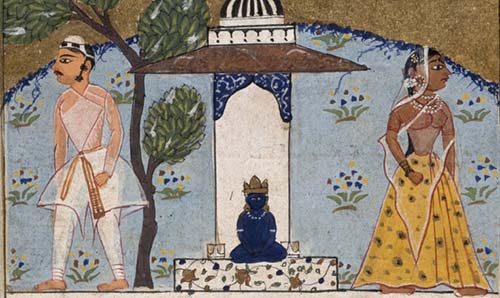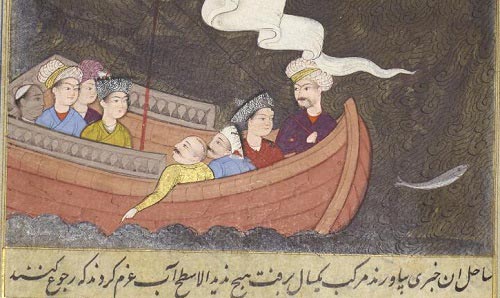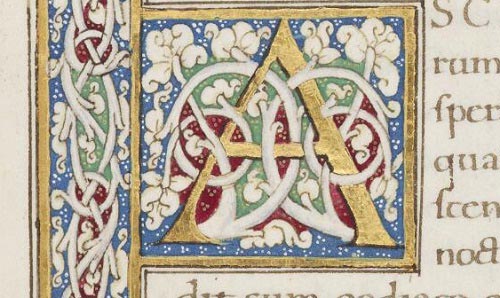
South Asia Collections
The Library holds internationally significant collections of South Asian manuscripts.

The manuscript collections cover a wide variety of formats, languages and scripts, reflecting the diverse written heritage of South Asia. The collections provide extensive coverage of religion and literary culture, but also encompass visual arts and history, geography, linguistics and science.
The manuscript collections are complemented by an important collection of papers relating to the East India Company and some notable print materials.
The Ahmed Iqbal Ullah RACE Centre, part of the University of Manchester Library’s Special Collections but located in Central Library, holds unique collections related to South Asian diaspora communities in Manchester and race relations in the UK.
Languages and cultures
The largest group of Indic language texts is the collection of 83 Pali manuscripts, formed by Professor T. W. Rhys Davis (1843-1922). The collection primarily concerns Theravada Buddhism, but texts cover a range of subjects including medicine, astrology, law, music and literature. Of these, 55 manuscripts derive from Sri Lanka and are in Sinhalese script. The manuscripts date from the 17th-19th centuries and include some unusually complete copies made by Sri Lankan scholars for Rhys Davis. Most of the Pali manuscripts were written on palm leaves, but there are also manuscripts written on paper and lacquer.
For about 2000 years, people in South and Southeast Asia wrote on palm leaves. In addition to the Pali, the Rylands holds 16 palm-leaf manuscripts in Sinhala (‘Sinhalese’), smaller collections of palm-leaf manuscripts in the Dravidian languages of Tamil, Telugu, Kannada and Malayalam, and a few in Sanskrit, Tibetan, Bengali and Odia (‘Oriya’). There are also paper manuscripts in a range of Indic languages, including Sanskrit, Hindustani, Marathi, Gujarati, and Punjabi. These collections encompass a range of subjects and writing traditions.
Islamicate culture in South Asia is an important part of the collections. A substantial proportion of the Persian and Arabic manuscripts derive from South Asia. The Persian collection comprises almost 950 manuscripts of the early 13th-19th centuries CE, many superbly illuminated and illustrated with the finest miniature paintings, or housed in decorative bindings. Islamicate culture is also represented by a collection of manuscripts in Pashto (Afghan) and the ‘Hindustani’ manuscript collection which includes texts in Urdu, Hindustani, Bengali, Persian and Gujarati. The richly illustrated manuscript of the Laur-Chanda of Maulana Daud of Dalmau (Hindustani MS 1) preserves an almost complete text of an Indo-Islamic love story known elsewhere only from a few leaves. A small but important collection of albums of Persianate painting and calligraphy from Iran and India awaits scholarly investigation.
The Rylands holds many works in translation throughout our manuscript, archive and print collections. The Carcanet Press Archive contains correspondence and drafts relating to the work of several modern South Asian writers including Meena Alexander, Sujata Bhatt, Jayanta Mahapatra and Vikram Seth. Other materials relating to the study of language and translation include grammatical and lexicographical works in a range of languages, and research papers of scholars from Sir William Jones (1746-1794) to University of Manchester academics.
Religious traditions
The collections represent many of the major religious traditions of South Asia. The large collections of Arabic and Persian manuscripts, and a smaller collection of Pashto (Afghan) manuscripts, cover many dimensions of Islamic theology and practice.
The Pali collection alongside texts in Tibetan, Sanskrit, Nepalese and Bengali, represent a range of Buddhist traditions. The Tibetan Manuscripts also contain a group of Bon religious and ritual texts and the Rylands holds a single Jain text among the Sanskrit manuscripts. Hindu texts, including richly illuminated scriptures, are present across the Indic language manuscripts, especially in the Sanskrit and Hindustani collections. One of the most significant items in the collection is a 17th-century manuscript of the Sri Guru Granth Sahib, the sacred scripture of the Sikh religion and regarded as a living guru (Punjabi MS 5). There are two further Punjabi manuscripts containing Sikh scripture.
The Library’s small but important collection of Zoroastrian (‘Parsi’) manuscripts comprises copies of the Avesta, alongside religious, literary, historical and astrological texts. Primarily copied in Iran and India during the 14th-19th centuries, they encompass a variety of languages (including Avestan, Middle Persian, Farsi, and Gujarati) and a variety of scripts (including Pahlavi, Nagari, Arabic and Pazend). The large Persian Manuscripts collection also contains Zoroastrian texts.
The collections reveal a broad range of Christian activity in South Asia, from Persianate miniatures of the Holy Family to Tamil manuscripts copied by Jesuit missionaries. The Bible Collection contains many early translations of the Bible into Indian languages, some printed or hand-written in South Asia, others prepared by Christian missionaries in Europe. Archives of Protestant Nonconformist missionary organisations, especially the Christian Brethren Archive, comprise the largest and most important collections related to Christianity in South Asia. The archive of the Brethren missionary organisation, Echoes of Service, includes extensive files relating to missionaries working in South Asia during the 20th century, as well as numerous lantern slides which depict missionary activities and typically portray indigenous peoples from a European perspective.
South Asian diaspora
The RACE Centre collections include a range of materials relating to Asian communities in Manchester and to the recent history of South Asia, particularly the Partition of India. People of South Asian heritage have created many of these collections, and the RACE Centre continues to support diverse Asian communities to explore, document and archive their experiences and histories.
Oral histories - the voices of real people - are a significant and extremely rich part of the RACE Centre collections. Exploring Our Roots, for example, includes life story interviews with people of Sikh, Bangladeshi, Pakistani and Indian heritage living in Greater Manchester.
Many of the RACE Centre archives are associated with projects and organisations. These include the Memories of Partition Project, the Dishera Diwali Mela, Ananna (Manchester Bangladeshi Women's Organisation), the Tandana Collection (Asian Youth Movements), Southern Voices (a Manchester community organisation) and the Sikh Family History Project.
Colonial histories
As a historical resource, the Eurocentric collections described below reflect the racism of the era in which they were created, and contain material that can be offensive, violent and oppressive. The University of Manchester rejects the practices and beliefs represented in these collections, but we are committed to providing access to them as evidence of the inequalities and attitudes of the time. We encourage people to use these collections in ways that challenge continuing inequalities.
The Rylands holds several important collections relating to the East India Company, the British trading company that colonised large areas of South Asia from the late 1700s onwards. The most extensive are the East India Company collections are the papers of Richard Johnson (1753-1807), Thomas Munro (1761-1827) and John Charles Mason (1798-1881). Several family and estate collections also contain significant documents related to British interests in India, including the Grey (Stamford) Papers, the Jackson Family Papers, the Pitt Collection, the Hibbert-Ware Papers and the Melville Papers. The collections are particularly comprehensive in their coverage of the management of the East India Company in the second half of the 18th century, especially the Warren Hastings affair. Other important documents relate to trade and to the Marine Branch, including the transport of troops during the First Indian War of Independence in 1857-8. The Carrington Papers include letters and papers relating to Sir Codrington Edmund Carrington’s term as Chief Justice of Ceylon (Sri Lanka), in the early 1800s.
The pasts of the collections themselves provide evidence of South Asian history, especially the impacts of British colonisation. Many of the manuscripts in the Rylands come from libraries formed by European collectors and by the British in India. Encouraged by Warren Hastings (1732-1818), Governor General of India, some British officers became interested in Indian language and culture. They created a vast body of academic writings, lesser-known regional surveys, collections of objects and manuscripts, and compendiums of illustrations of Indian castes and occupational groups. The Library holds such works across its printed, manuscript and visual collections. The manuscripts in the Crawford Collection acquired from Colonel G. W. Hamilton (1807-68), for example, include many Hamilton commissioned from Indian scholars and scribes. However, British soldiers also took manuscripts by force and looted royal libraries.
In 1858, the British Crown took over direct control of India. The Indian Empire Collection of printed materials contains British government reports, publications and rare state papers. The Papers of Field Marshal Auchinleck (1884-1981), a British Army commander, comprise an important record of the final years of British rule in India up to 1947. They document the rise of the nationalist independence movement, the transfer of power from Britain to India, and the formation of Pakistan through the partition of Muslim-majority areas.
List of collections
Physical collections
- Arabic Manuscripts
- Auchinleck Papers
- Bagshawe Family Muniments
- Carcanet Press Archive
- Carrington Papers
- Crawford Collection
- East India Company Papers
- Echoes of Service Archive
- Grey (Stamford) of Dunham Massey Papers
- Guardian (formerly Manchester Guardian) Archive
- Hibbert-Ware Papers
- Indian Empire and East India Company Printed Works
- Jackson Family Papers
- Manchester Geographical Society Photographic Slides Collection
- Melville Papers
- Thomas Munro Papers
- Pali Manuscripts
- Parsi Manuscripts
- Persian Manuscripts
- Pitt Collection
- RACE Centre Archives
- RACE Centre Library
- RACE Centre Oral histories
- Tibetan Manuscripts
Digital collections
- Ahmed Iqbal Ullah Race Relations Collection in Library Digital Collections
- Guardian Collection in Library Digital Collections
- Maps Collection in Library Digital Collections
- Non-conformist Collection in Library Digital Collections
- Persian Manuscripts in Manchester Digital Collections
Further information
Related subject pages
- Ahmed Iqbal Ullah RACE Centre Collections
- Christian Brethren Archive
- Middle East Collections
- Military, Colonial and International History Collections
- Religion and Theology Collections
- Southeast Asia and Australasia Collections
Finding aids
- Fihrist Union Catalogue of Manuscripts from the Islamicate World in UK Institutions
Rylands blog posts
- Cataloguing Persian Manuscripts at the John Rylands Research Institute and Library
- Diversifying special collections: reflecting on our decolonisation research project so far (part 2)
- From Calcutta to Tarcento: Jewish marriage contracts from the collections
- Rediscovered: Persian poets and poetry
- South Asian Heritage Month Collection Close up: Preserving Palm Leaf – A Sacred Manuscript Tradition
- South Asian Heritage Month Collection Close Up: Tales of Panji
- South Asian Heritage Month Collection Close Up: Punjabi 5.
- The Laur-Chand: an Indian Sufi romance

Exploring subject areas
An overview of our Special Collections, including information about the background and history of our holdings.

Special Collections A-Z
Explore the Special Collections through the collection names and descriptions using our searchable A-Z tool.
